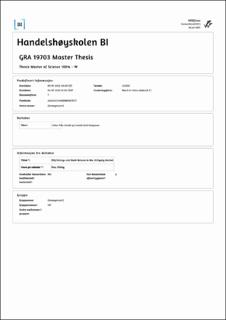| dc.description.abstract | This thesis investigates the relationship between ESG ratings and stock returns in the US equity market. Using the companies listed on the S&P 500 as a benchmark for the American stock market we perform a long-short zero investment strategy based on the companies ESG scores, with a short position in the lowest, and a long position in the highest ESG rated companies. We use three different ESG ratings to construct our portfolios, including Bloomberg ESG Disclosure score, Refinitiv ESG score, and Refinitiv ESG Controversies score. In order to provide robust results and account for possible differences in risk exposures of the portfolios we use multivariate regression analysis, applying the Fama-French (Fama & French 1993 & 2015) and Carhart (1997) framework. Our study returns negative significant alphas for both the Bloomberg ESG Disclosure, and the Refinitiv ESG study, which indicates a negative relationship between high ESG performers and stock returns. However, when controlling for ESG controversies, the ESG portfolios do not state a significant return difference between the top and bottom ESG portfolios. Our findings indicate that investors should adjust their expectations and no longer anticipate abnormal returns by trading a difference portfolio of high and low ESG rated companies using ESG as the sole portfolio screen. | en_US |
